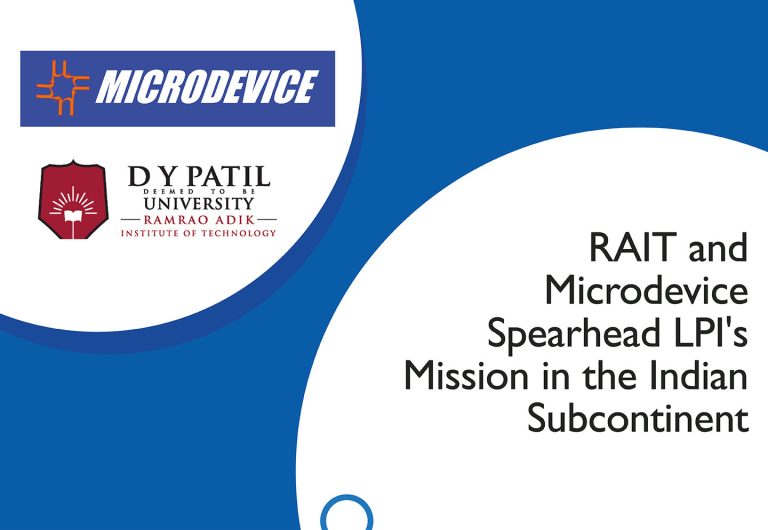RAIT and Microdevice Spearhead LPI’s Mission in the Indian Subcontinent

Given India’s four million computing jobs and 880,000 computer science students annually enrolled, it is an important part of the Linux Professional Institute (LPI) mission to internationally support open source professionals to offer certifications in that part of the world. I had the chance to talk with two leaders of Indian educational institutions that recently signed up as LPI partners: Govind Gaundalkar of Microdevice Technologies and associate professor Prasiddh Trivedi of the Ramrao Adik Institute of Technology (RAIT).
The Pitch to LPI and to Indian Partners
Govind Gaundalkar, at Microdevice, knew LPI and reached out to them to get certifications offered in India. LPI’s efforts in the Asia Pacific expanded greatly in 2019 with the support of a newly hired Partner Development & Success Manager, Jolly Villaviza, who is based in the Philippines and pursues opportunities for partnerships in that region. Jolly picked up and acted on an earlier request by Govind. “Govind is very passionate in presenting open source to organizations in India. He grasps LPI’s mission of supporting people who are working with open source in India,” Jolly said.
Five months ago, Microdevice Technologies became an Approved Training Partner and Approved Channel Partner and started offering certification exams. Govind then became a strong advocate for LPI, persuading RAIT and three other colleges to become partners. RAIT came into partnership at the highest level—Platinum—right away. All four institutions are in Mumbai.
Offering LPI certifications is part of the larger task of teaching open source. Although Microdevice Technologies offers courses in Linux-related topics at about INR 1600(20USD) for Linux Essentials (partly in conjunction with the Xavier Institute of Engineering, another recent LPI partner), RAIT had nothing related to open source except courses on the MySQL and PostgreSQL databases. (One could also count other courses that cover programming languages.) Now RAIT is increasing its course offerings in open source.
Costs of Computer Education
One of LPI’s most helpful actions recently, to spread certification in emerging markets, is their revision of exam prices. The cost to Indian exam-takers has been reduced by 35%, which is crucial for many students.
Trivedi told me that RAIT has worked very hard to keep the cost of an education affordable. A student can get a bachelor’s degree in technology or engineering for 450,000 rupees, which is currently about $6,000 US or €5,000. RAIT has kept the cost of training students for LPI certification down to 1,000 rupees, which is $12 US.
Computers themselves are a significant cost. Many students can afford only a mobile device, not a laptop or desktop system. Luckily, all the computer courses taught by Microdevice and RAIT can be done on computers stored on their campus, and students can log in remotely. Some of these computers even have GPUs, which is crucial to study machine learning. Virtualization also lowers costs, because many students can work on one physical computer without a noticeable degradation of response time.
LPI has just approved a grant to Microdevice. This project will help create a 20-seat laboratory that will offer LPI courses to students and professionals. The space will also be a future center for LPI exams.
RAIT is considering a move to a cloud vendor such as AWS during its next major upgrade. However, it is important to give students accounts through the university; it should not be necessary for a student to get an account directly with AWS. Among other problems, AWS requires a credit card, and many students are too young to get one or don’t qualify for one.
Govind is also lobbying LPI to grant permission to Indian institutions to offer in-person certification exams. These can be offered at a much lower cost because, among other things, one proctor can perform the test for many people at the same time. Furthermore, Indian students are more comfortable taking tests with pencil and paper.
Tools that Facilitate Getting a Certification
The Learning Materials, a relatively recent initiative at LPI, is enormously beneficial to people seeking certification. Govind is talking to LPI about two other types of offering that other certification organizations offer: on-demand training (especially useful for the low-level Essentials certifications) and practice exams.
Finally, Govind seeks to provide students for the unpaid internships that LPI plans to offer. A three-month internship adds a lot of value to their resumes.
Currently, the Mumbai institutions offering LPI-related training and certification are only a tiny toehold. LPI’s mandate covers the entire world, so any expansion into emerging markets is news worth reporting.